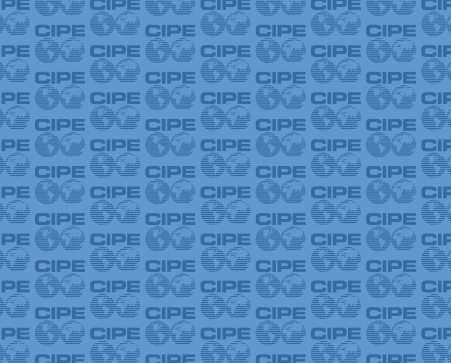
“If a company’s goal is to stay in business for a long time, why take the shortcut and pay bribes, which can damage the company in the long term?” asked Sammy Hamzah, president of Indonesian Petroleum Association, at the launch event of CIPE and International Business Links (IBL)’s new Anti-Corruption Compliance guidebook for mid-sized companies in Indonesia’s oil and gas industry.
“When a company commits a corrupt behavior, it takes on average 20 to 30 years to bring back the company’s credibility.”
Corruption is a major problem in Indonesia. According to a Gallup poll, more than 8 in 10 Indonesians say that corruption is widespread throughout the nation’s government and businesses. The oil and gas sector is particularly susceptible to corruption because of the multiple steps in the procurement and licensing processes, as well as the sheer amount of the money involved.
That’s why CIPE and IBL produced the guide. It’s intended to help mid-sized companies looking to become suppliers of local or international oil and gas companies to understand the business case for anti-corruption compliance and instruct them on how to create an internal compliance system.
The reality is challenging, however, when even the enforcers in the industry are the perpetrators of corruption. In 2013, the head of the oil and gas regulatory committee (SKK Migas) was arrested for taking bribes as part of a tender from a Singaporean oil company. Yet things are slowly changing and stronger ethical regulations and rules are being implemented by the Indonesian government.
Dr. Parulian Sihotang, the Deputy Financial Controller of SKK Migas, who was the keynote speaker at the launch event, noted that SKK Migas itself has stricter rules in place and that all employees are expected to abide by the “Four ‘no’ lists: no bribery, gift, kickback, nor entertainment.”
Moreover, SKK Migas now applies the “right to audit” clause in every contract or agreement with vendors or any kind of third party. These random spot checks are designed to make sure that vendors are complying with Indonesian anti-corruption laws, the U.S. Foreign Corrupt Practices Act, and the UK Anti-Bribery Act.
Giri Supradiona, a candidate for Indonesia’s Corruption Eradication Commission (KPK), also noted that promoting ethical behavior involves effort from both the government and the private sector. “It takes two to tango. Corruption doesn’t happen if there is only government officials demanding bribery… it happens because companies willingly pay the bribes as well. KPK must, therefore, work in cooperation with the private sector to demand anti-corruption compliance at all the steps of the oil and gas industry.”
Indeed, fighting corruption is seen as an uphill battle by all stakeholders in the Indonesian economy. With time, however, the current status quo may slowly change. Hopefully effective anti-corruption regulation and compliance efforts will help reduce corruption, resulting in a decrease in the cost of doing business and greater economic growth overall in the country.
Maiko Nakagaki is a Program Officer for Global Programs at CIPE.
Published Date: September 21, 2015